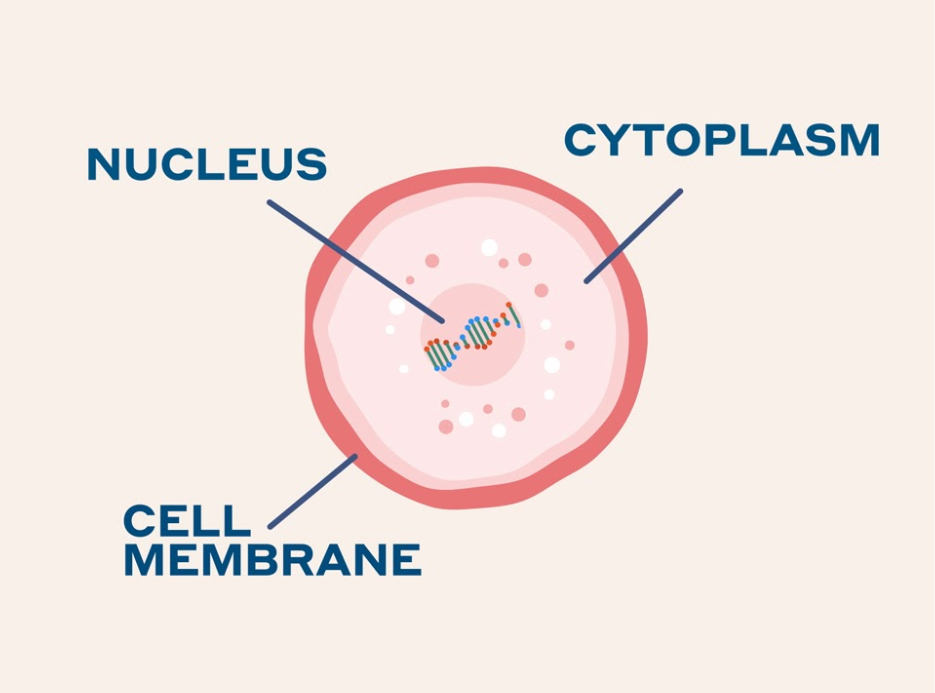Understanding cancer and how you can help yourself
What Is Cancer?
In order to help yourself or those around you affected by cancer, you first need to understand what cancer is. This in itself is one of the biggest challenges as cancer is such a complex and multifaceted disease. Cancer can make you feel like you’re at a standstill, with no end in sight and a number of important decisions to make. Understanding you are not alone can help.
In short, cancer is the result of DNA mutation, which results in a genetic disease. Mistakes and issues in our DNA, of which we cannot control, can result in uncontrolled cell growth.

Normal cells regulate life, death and everything in between
When cancer is present, normal cell control no longer works, which means dangerous cancerous cells can grow unchecked and ultimately spread to other parts of the body.
It is part of our human nature to try and protect ourselves, it is only natural for us to avoid pain and seek pleasure. Sadly, cancerous cell division is out of our control.
Similar to humans, cancer also follows the survival process. The growing disease seeks immortality by avoiding the body’s checks and balances – the irony is that cancer’s success is really a failure as unchecked growth ultimately leads to its own death.
How does a normal cell become a cancerous cell?
There are trillions of cells within the body, but it only takes one to go wrong to mess everything up.
This process doesn’t happen overnight; cancerous cells develop slowly over a long period of time. The process of diverging from their normal state to the cancerous state can take between 2 and 40 years, causing numerous problems along the way. At each stage, the cancerous cells follow a similar process, some quicker than others.
Firstly, certain changes occur in the DNA before the cell even becomes cancerous, then additional DNA damage occurs that knocks out the body’s defenses against this growth – cells no longer obey signals to stop growing or commit suicide.
Further DNA damage then allows cells to access the body’s blood supply, meaning the growing cancer mass can nourish itself with nutrients and survive. Further genetic defects allow the cells to move from the original cancer site to other parts of the body – this process of movement is known as cancer metastases.
Over 90% of cancer deaths result from metastases, and it is this ability to move around the body that distinguishes malignant from benign tumors.
Ultimately, it is thought that all cancer starts from a single cell that has, over time, experienced a combination of DNA changes that allow it to grow unchecked and avoid the body’s inbuilt safety mechanisms.
Can you inherit cancer?
You can inherit DNA mutations and errors, which is thought to make it more likely to develop cancer.
For example, inheriting some mutations in the BRCA genes can increase the risk of developing breast and ovarian cancer. Many of the inherited cancers are linked to errors in the DNA repair genes, so the cells are less able to maintain DNA integrity. In some people, the risk is related to specific tissues or organs.
However, this is not the only way for cells to go wrong. For many individuals, cancers are caused by a combination of some inherited DNA errors and acquired DNA damage.
To add even more complexity to the disease, DNA damage isn’t the only way cells can mutate. Issues can arise within the structures and processes that control the DNA, so- called epigenetic components, can also be changed by carcinogens and by other factors. We discuss these topics in more detail in our personalised video series.
The process of cancer
After a cell has transformed to a cancer cell, there are many steps along the way that continue to influence the development of cancer as a disease.
The immune system can detect some cancer and destroy them before they are established, other cancers may never be noticed.
It is thought that early stage and low-grade cancers have fewer DNA mutations, compared to more advanced aggressive cancers. Which tend to have more errors. Why? These differences may be due to the tissue where the cancer starts, the genetic changes that led to the cancer starting, and the environment in the body.
What else affects cancer?
Hormones may drive some cancers. The female hormone estrogen has a function of stimulating normal breast cell replication, but can also cause breast cancer cells to grow. The high rate of cell division in breast tissue makes it more susceptible to mistakes in the DNA replication process so that abnormal cells are more likely to arise, and estrogen can target specific cell receptors that drive the growth of the cancer.
Diet, exercise, lifestyle and cancer
There are many studies and research papers that highlight the link between exercise, endorphin release, and positive mood. The process is no different when it comes to helping yourself with cancer.
Eating well can help your body at all stages of the cancer journey from diagnosis, through treatment and recovery. Following a balanced diet can also influence those around you to lead a healthier lifestyle, meaning the impact can go beyond those living with cancer.
Much research considers food to be a key element in your armoury against cancer following diagnosis, whatever your stage. This is not to replace treatment, but to support alongside medical advice to get the most out of your treatment and to boost your resilience.
There’s no single study proving it will help, and there’s no single food that’s a miracle, but there is enough evidence to suggest that some food choices can be of real benefit. This is not just in how patients feel, but also maximising your health while living with disease, preventing recurrence, or living well in a palliative situation.
Help yourself and those around you
We want to empower you to help yourself.
After a cancer diagnosis, overall diet quality and choosing particular foods can be very helpful for supporting health and resilience. These choices can also contribute to other aspects of your health and wellbeing.
After a cancer diagnosis, dietary needs can change, especially at different stages of cancer and particularly at different stages of treatment. Studies have identified foods that can help prevent cancer and foods that may increase cancer risks.
For people living with and beyond cancer, a better quality diet is associated with longer survival according to studies. Some foods with particular anti-cancer properties have been identified.
Overall, a higher intake of plant foods is beneficial, providing an array of vitamins and minerals, and particularly phytonutrients, botanical compounds in certain foods are especially valuable as they have anti-cancer properties.
Reducing or avoiding red and processed meat is advisable as there are compounds in these foods that may trigger cancers to start. Very recent research suggests that eating plenty of fibre helps to support a healthy population of microbes in the digestive system, and this can have a benefit for immunity. Healthy unprocessed fats such as olive oil, and oily fish provide essential fats that help healing and may help reduce inflammation. Individual needs may differ, and dietary changes need to be considered for each person’s situation and taking account of other restrictions they may need to follow.
The key point to take away from reading this article is that everyone is different and your destiny is not predetermined.
We want you to think for yourself, and make decisions based on the evidence, which we will discuss later in this video series. We can’t tell you which one is more important or what the respective weightings are. That will vary from patient to patient. But what we can tell you is that science says that lifestyle might make a huge difference. It’s the low hanging fruit we should all be picking and the best place to start in your efforts to beat the average by a long way.
For a free preview of episode 1, please follow the link below:
![[AD] ✨ Festive magic for local families in the heart of Guildford ✨
We had the loveliest evening exploring the @guildfordilluminate light trail at Guildford Castle
The trail takes around 30–40 mins
with cosy stops for hot chocolate and toasting marshmallows, it’s a gorgeous Christmas activity for Surrey families.
It’s on until 4th January and makes the perfect festive plan:
🛍️ Christmas shopping in town
✨ The light trail
🍽️ Finish with dinner in Guildford
If you’re looking for a magical, stress-free festive outing with the kids — this is one to add to your Christmas list
📍 Guildford Castle, Castle St, Guildford GU1 3SX
#GuildfordWithKids #SurreyFamilies #ChristmasInSurrey](https://suburban-mum.com/wp-content/uploads/2018/09/589257185_18566118850016840_4432952740767953046_n-180x320.jpg)
![[AD] We went to the newly opened Cha Sha Kingston a couple of weeks ago, and wow — taste bud adventure unlocked! The boys devoured the masala fries and chicken tikka rolls, while we couldn’t get enough of that epic kebab butter curry 😍🍛.
It’s amazing value for food this tasty (and everyone left happy and VERY full!).
Delicious food, vibrant vibes and incredible value — the perfect combo for your next meal.
📍Cha Sha Kingston
43 Surbiton Road, KT1 2HG
🌐 chasha.co.uk
Other Cha Sha locations in Birmingham, Ilford, Southampton and Wembkey
#ChaSha #ChaShaKingston #KingstonEats #FoodieFinds #UKFoodie #FoodReview #KingstonUponThames #FamilyEats #FamilyDining #FoodieKids](https://suburban-mum.com/wp-content/uploads/2016/02/574770541_18560351146016840_6855048070839528040_n-180x320.jpg)

![[AD] We’re a cricket-mad family, so we’re buzzing that @thehundred is back this August! 🏏🔥
To get ready, M tried out the official FREE Activity Pack — and it’s brilliant! 🙌
Packed with fun games, creative challenges and sporty tasks, it’s perfect for getting kids hyped whether you’re at home or on the go.
👉Download yours now (link in bio)
@londonspirit @ovalinvincibles #EveryMomentCounts #TheHundred
#EnglandCricket #CricketFamily #TheHundredCricket #LondonBloggers #Cricket #CricketIsLife #kidsfun](https://suburban-mum.com/wp-content/uploads/2022/11/505472555_18531279601016840_7092520074819907569_n-180x320.jpg)



![[AD - Press visit]
We enjoyed the glorious sunshine this weekend with a trip to Brighton. We went on the @brightoni360official which is right by the sea front.
The i360 pod take a slow journey up, allowing you to take in views across Brighton and the South Downs 450ft above ground. There’s a bar inside with drinks and snacks available to purchase and the experience lasts 25 minutes.
Afterwards, we headed to the open air roller rink for a roller skating session!
The roller rink is:
⭐ Suitable for over 5s
⭐ £6.50 if you have your own skates or £9.50 if you need to hire them
⭐ 45 minutes per session
Full details to visit the i360 + skating
📍 Brighton i360, Lower Kings Road, Brighton BN1 2LN
🚗 Parking nearby (we parked in the Regency Square Car park)
🎟️ Prices start from £25.40 for an adult and £16.90 for a child
🕐 Opening hours are currently Sun-Fri 10.30am-18.30pm and until 19.30pm on Saturdays
☕️ Bar inside the i360, cafe and gift shop
Book tickets here:
https://tickets.brightoni360.co.uk/tickets/?_ga=2.195305772.1869001490.1689671753-1757164059.1689671753/#events?eventid=157](https://suburban-mum.com/wp-content/uploads/2015/04/417980235_313576471048632_3682382982231216432_n.jpg)

![[AD] ***Summer of fun at Barracudas Activity Camps!****
There is plenty for kids to do at @barracudas_activity_day_camps
From Tennis, Archery, Swimming, Motor Sports and more you can be sure that there will be something for kids aged 4.5-14. ⚽🏈🥅🎾🏓🏎️🏹🏊♂️🏉
You can book on a day by day basis - so it can fit in with any other days out/activities you have planned and there are early drop off and late pickup options available. Barracudas are also Ofsted registered so you can use your Childcare Vouchers too.
⭐⭐⭐Get £20 off a week or £4 off a day using my discount code: MARIA20⭐⭐⭐
#BarracudasActivityDayCamp #BarracudasActivityCamp #BarracudaAmbassadors #SummerHolidays #SchoolHolidays #Summer2023 #SummerCamp #DayCare #Camp #KidsCamp #surreymummy #surreymums #SummerOfFun #ActivityCamps #HolidayCamps #Childcare #SchoolHolidays #schoolholidaycamps](https://suburban-mum.com/wp-content/uploads/2024/07/353583570_625625966167953_545896259645102575_n.jpg)



![[AD] We have some super exciting news...we have been chosen to be Laser Quest Ambassadors, and the boys are over the moon!
We are really lucky that our local Laser Quest (@laserquestkingston) is just around the corner from us. It means we can pop in of a weekend or anytime during the school holidays, and with summer just around the corner, I know Laser Quest will be one of our go-to places for some family fun.
As well as games of Laser Quest, there are also VR experiences and arcade amusements too. To find out a bit more about how Laser Quest works, you can read my blog post: https://www.suburban-mum.com/laser-quest-kingston/ (clickable link in bio)
Don't forget to keep an eye out for our Laser Quest posts - I'm going to be giving away two family passes to use at Laserquest Kingston!
If you can't wait and want to head down to Laser Quest to try it out, use the code SUMMER30 for 30% off your booking. The code is valid from now until the end of August 2023 and can be used on Laser Quest games and birthday party bookings.
#LaserquestAmbassador #Laserquest #LaserquestKingston #ActivitiesForKids #FamilyFun #DaysOutWithKids #Lasertag #LaserquestVR #Kingston #ThingsToDoInKingston #SurreyFamilyDaysOut #ThingsToDoWithKids #RainyDayFun #SurreyMummy #SurreyLife #LifeWithKids #LifeWithBoys #familyfunday](https://suburban-mum.com/wp-content/uploads/2015/04/353230107_797358078406942_2405522556733455165_n.jpg)

![[AD] The sun has finally made an appearance and the boys have been making the most of it by spending it
in the garden.
They’re go-to is always football and they’ve been trying to improve their aim and accuracy with the new Messi Foldable Footlball goal from the #MessiTrainingSystem range.
I love the fact the goal is foldable, making it easy to store away when not in use. It is also lightweight so you can effortlessly pack it up and take it to the park or to a friend’s house.
The Messi Foldable Football Goal retails at £36 and can be purchased from @argos
You can read my full review here: https://www.suburban-mum.com/messi-foldable-football-goal/
#TrainLikeMessi #FoldableFootballGoal #FootballSkills #OutdoorFun #LionelMessi #LeoMessi #FootballAtHome #OutdoorKids #JustGetOutside #OutdoorsAndFree #ScreenFreeKids #WhateverTheWeatherKids @flair_gp](https://suburban-mum.com/wp-content/uploads/2015/04/341194882_615024710178056_41977149395989448_n.jpg)

![[AD] We are absolutely thrilled to announce that we are Barracuda Ambassadors again this year.
With Easter just around the corner, the boys were sent the @barracudas_activity_day_camps new camp kit in preparation for the school holidays.
There’s a wide range of activities for kids aged 4.5 - 14 including Tennis, Archery, Basketball, Arts & Crafts and more.
If you like the sound of Barracudas, find out more over on their website. You can also save £20 a week or £4 a day, using my discount code: MARIA20](https://suburban-mum.com/wp-content/uploads/2024/07/336812306_765234558514317_685553691647241974_n.jpg)





